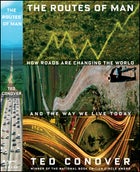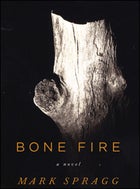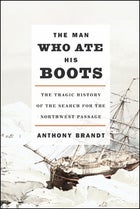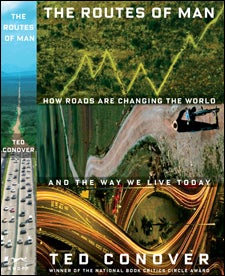For more than 25 years, Ted Conover has pushed immersion journalism to the highest levels. He rode the rails with hobos in Rolling Nowhere, smuggled himself across the U.S.-Mexico border in Coyotes, indulged in Aspen’s high-end hedonism in Whiteout, and hired on as a guard at New York’s Sing Sing prison in Newjack. His latest, The Routes of Man: How Roads Are Changing the World and the Way We Live Today (Knopf, $27), finds Conover traveling hard roads from Peru to East Africa. BRUCE BARCOTT caught up with him to discuss his latest adventure.
Routes of Man

Why does the road hold such romance for us?
Most stories begin one of two ways: A stranger comes to town, or the hero leaves home. Either way, they tend to go by road. The road contains the excitement of the unexpected. There’s a quote from Tolkien’s The Fellowship of the Ring that I love: “You step into the Road, and if you don’t keep your feet, there’s no telling where you might be swept off to.” When you hit the road, you’re worried about leaving comfort behind; you don’t know if you’re going to come back. There are monsters out there.
You write that “roads can bring unforeseen consequences.” Like what?
In East and Central Africa, the roads I traveled were built to bring the benefits of development: to spread knowledge, spur the economy, deliver medicine. But viruses reach the wider world over those same roads. In Peru, better roads would escalate the illegal mahogany logging that’s going on there. But I’ve been there during the rainy season and seen lines of trucks and people covered in mud and thought, Man, these people need a better road.
Do you ever find yourself arguing against roads?
I think you can reasonably argue against roads in natural areas, especially in the United States. I’m in favor of the roadless rule in national forests. I’m in favor of mass transit wherever practicable. But I’m not blind to the fact that we’d be nowhere as a nation without roads.
What’s the worst road in the world?
Probably the road from Kabul to Kandahar, in Afghanistan, which I haven’t had the pleasure to travel. In the early years of the war, the U.S. spent nearly $200 million to rebuild a 300-mile stretch of highway, but on the day it was dedicated it was too dangerous for the dignitaries to drive it. They had to be flown in for the ceremony. The strangest road I’ve ever traveled is connected, in a way, with that Afghan road: the 200-foot paved road leading to the front gate at Camp Delta, the prison at Guantánamo, Cuba. It’s squished and curved like ribbon candy, presumably so terrorists can’t get up speed to ram the gate. Even though I came in as an American journalist, I felt I could be shot at any moment.
Books: Bone Fire
No country for young men.
Bone Fire

There’s plenty of horseback riding and bucolic prose in Mark Spragg’s novel Bone Fire (Knopf, $26), but there’s nothing sentimental about his story of northern Wyoming, set in the fictional town of Ishawooa. This is New West all the way—a place to escape from, not to. Those who populate the modest ranches include an art-school dropout caring for her grandfather, a ten-year-old growing up quick in the absence of his mother (who’s off selling New Age enlightenment at the behest of her “Guides”), and Crane Carlson, a sheriff suffering from Lou Gehrig’s disease. Early on, a murdered teen is discovered in a meth lab, and Carlson’s plodding investigation forms the backbone of Spragg’s narrative. But it’s the author’s endearingly biting characters, not the slowly unpacking whodunit, that drives the book. You root for these people no matter how much dysfunction they leave in their wake, mostly because they’re always saying things you’d never have the guts to utter out loud. “You want me to talk with [your manager] about this attitude you’ve got going on?” a woman asks a motel clerk who’s just implied that he knows she’s there for a tryst. “No, ma’am,” he replies. “Then try not being such a smutty little shithead.” Spragg, who lives in Wyoming, understands how people endure the state’s harsh lifestyle: Hard times go down easier when you’ve got a bitter sense of humor.
Books: The Man Who Ate His Boots
If at first you don’t succeed…
The Man Who Ate His Boots

When not busy trying to colonize the Eastern Hemisphere, the Royal Navy spent most of the 19th century attempting to shave 6,000 miles off the trip to Asia, by way of North America. Anthony Brandt chronicles that frostbitten and futile era in The Man Who Ate His Boots: The Tragic History of the Search for the Northwest Passage (Knopf, $29). None of the 40-odd expeditions the British launched actually sailed the passage; that honor went to Norway’s Roald Amundsen, in 1903, eight years before he also beat the Brits to the South Pole. Though dense, The Man Who Ate His Boots also uncovers the period’s quirkier moments—such as when an admiral enlisted the ghost of his psychic daughter to locate an 1845 expedition.
Books: Green Gone Wild

Three new books go to the edge of environmentalism, and over.
1. SMART ADVICE
“Drink the spinach water.” From Food Rules: An Eater’s Manual, by Michael Pollan (Penguin, $11)
2. LESS SO
“Skimpier can be better when it comes to underwear, as less material=less water.” From The Green Blue Book: The Simple Water-Savings Guide to Everything in Your Life, by Thomas M. Kostigen (Rodale, $17)
3. REALLY?
“On vibes and other electronic toys: look for ones with rechargeable batteries.” From Eco-Sex: Go Green Between the Sheets and Make Your Love Life Sustainable, by Stefanie Iris Weiss (Ten Speed Press, $15)




